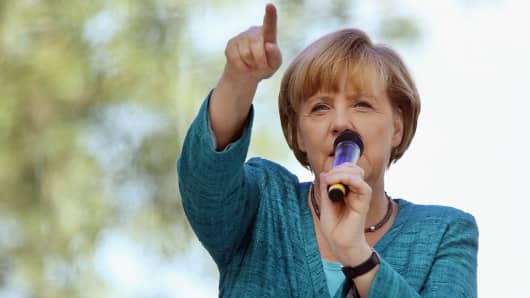German Chancellor Angela Merkel may be closer to a grand coalition with her socialist opponent in upcoming elections after he put in a surprisingly well-received performance in a TV debate Sunday.
Peer Steinbrueck, leader of the Social Democratic Party (SPD), came off better than expected in the debate,according to polls carried out by state broadcasters ARD and ZDF following the debate. Polls ahead of the election suggest that the CDU will win most votes,but its smaller coalition partners will see their share of the vote decline.
(Read more: Angela Merkel debates with rival)
While the polls differed on who won – ZDF's snap poll called it 40/33 for Merkel, while ARD's snap poll said Steinbrueck had the edge – they agreed that the German people surveyed thought the SPD head had done better than expected. Steinbrueck had become more popular, with 45 percent preferring him as their Chancellor, up 17 percent from a previous poll by Infratest dimap.
This should make it more likely that Merkel's right-leaning party, the Christian Democratic Union, will have to go into coalition with the SPD after elections later this month to ensure a majority.
(Read more: The secret to Germany's success)
"While this will not fundamentally turn the tide ahead of the 22 September Bundestag elections, it might help Steinbrueck's SPD to mobilize core voters and win the one or two additional points in support required to force Merkel's CDU into a grand coalition," according to Carsten Nickel, senior vice president at Teneo Intelligence.
Steinbrueck has criticized Merkel's austerity drive, and called for a minimum wage of 8.50 euro ($11.24) per hour. He has voted in favor of austerity policies in Germany in the past.
Last night, Steinbrueck threw his weight behind the controversial proposal for Eurobonds, bonds which would be issued by the European Central Bank (ECB), separately from the current eurobond market.
Michael Fuchs, deputy parliamentary leader of the CDU, criticized the idea, which would help collectivize euro zone debt, as "nothing else than socializing interest rates."
Fuchs restated the CDU's preference for a continuance of their existing coalition with theFree Democrats.
The outcome of the German election is likely to be a key factor in how the euro zone's economic crisis unfolds. Both Merkel and Steinbrueck acknowledged the potential need for a third program for Greece to deal with its debt during last night's debate, but neither gave much detail of their plans. Steinbrueck is known to be more in favor of economic stimulus along with austerity.



